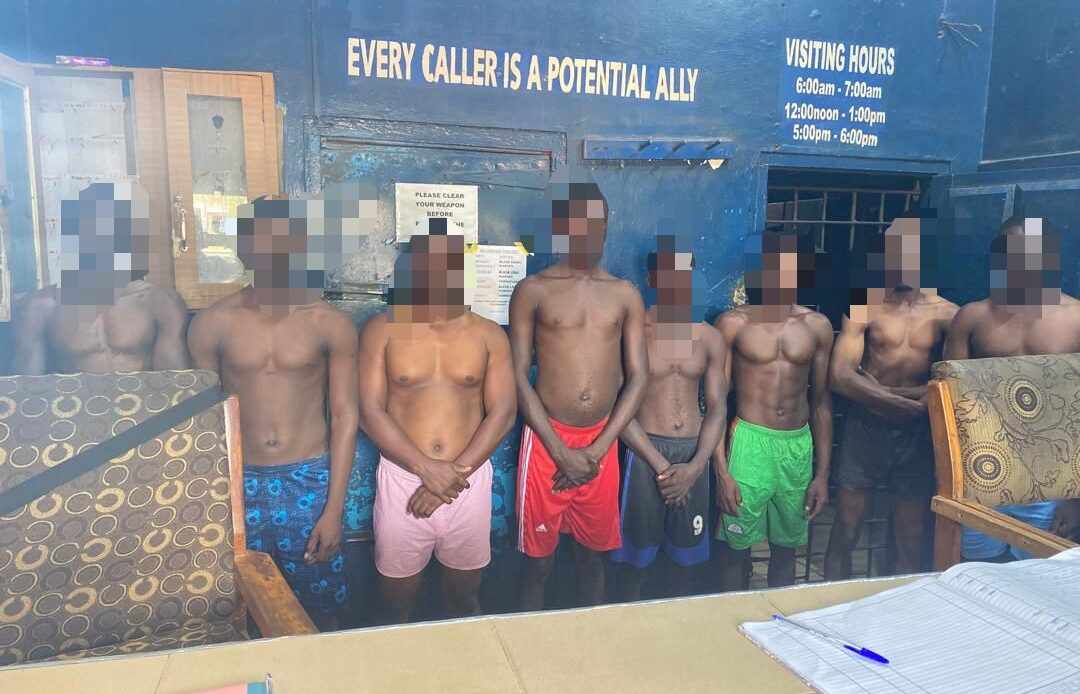
- Eight foreign nationals have been arrested in the Bono Region for illegal gold exploration and trading without a license.
- The suspects — from Ivory Coast, Nigeria, and Gambia — were apprehended at Wewe, a village in the Banda District.
- They were arrested on October 2, 2025, following a surveillance operation by the Bono Regional Police Command.
- Items seized include GH₵23,450, raw gold, gold dust, mercury, and a lighter.
- The suspects are assisting police investigations and will soon face court.
The Bono Regional Police Command has dismantled an illegal gold operation run by eight foreign nationals in the Banda District. The suspects, identified as Sayuba Ziba, Kienu Dobou, Osman Tunabu, Nana Alhassan, Wadrago Abdulai, Aliu Sali, Ibrahim Wulba, and Alhassan Imoro, were apprehended in Wewe, a small mining community in the region.
According to a statement signed by Chief Inspector Thomas Akeelah, the Bono Regional Police Public Relations Officer, the arrests were the result of a targeted intelligence operation carried out on Thursday, October 2, 2025.
The suspects, reportedly from Ivory Coast, Nigeria, and Gambia, were caught in the act of conducting unauthorized gold mining and trading activities. Police recovered GH₵23,450 in cash, several quantities of raw gold and gold dust, as well as mercury and a lighter believed to have been used in their operations.
Authorities disclosed that the seized items would undergo forensic analysis as investigations continue. All eight individuals are currently in police custody and are expected to be arraigned in court soon.
The operation is part of an intensified campaign by the Bono Regional Police to combat illegal mining activities, which continue to threaten local ecosystems and economic stability in the region.
Reflective Opinion
The arrest of these eight foreign nationals in the Bono Region once again exposes the deep-rooted crisis of illegal mining that continues to haunt Ghana’s natural resource sector. Despite numerous crackdowns and public campaigns, the lure of gold — and the profit it promises — keeps drawing both locals and foreigners into illicit operations that strip communities of their environmental integrity.
What is particularly alarming is the growing international dimension of this trade. The involvement of nationals from neighboring countries points to a porous border system and a well-organized network that transcends Ghana’s territorial limits. This calls for more than just police action — it demands diplomatic collaboration, stricter border control, and a revamp of local licensing systems that have often been manipulated or ignored.
Beyond enforcement, there’s also a socio-economic dimension to consider. Many rural communities where such illegal mining thrives are deprived of viable employment and infrastructure, leaving them vulnerable to exploitation by foreign operators promising quick gains.
If Ghana is to safeguard its mineral wealth for future generations, the fight against illegal mining must go beyond arrests — it must become a comprehensive policy effort combining community engagement, regional cooperation, and economic reform. Otherwise, every new arrest will simply be another headline in an ongoing cycle of gold and greed.